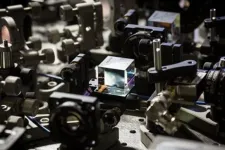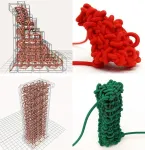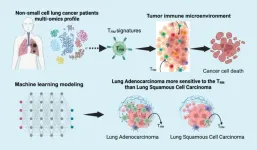(Press-News.org) Most Americans are aware of fake news and misinformation. In a new study, researchers from the University of Pennsylvania sought to uncover whether the threat of misinformation drives Americans to seek out news sources that reflect their own political beliefs.
The study, published in the Harvard Kennedy School Misinformation Review, found that Democrats, older individuals, and those with higher education levels are more concerned about misinformation in general and that, compared to Republicans, Democrats, in particular, are more likely to turn to partisan media sources when their concern with misinformation is greater.
Through analyses of nationally representative surveys of American adults, the researchers, led by Dolores Albarracín, the Amy Gutmann Penn Integrates Knowledge University Professor and Director of the Division of Communication Science at the Annenberg Public Policy Center, also found that a person’s perceived ability to distinguish between accurate and fake news does not affect how often they seek out news from partisan news sources.
“When under threat, humans do not always seek information in an optimal way,” says lead author Elizabeth Harris, formerly the William J. Henrich Postdoctoral Fellow at the Annenberg Public Policy Center. “In an ideal world, people who are worried about misinformation would use a broad range of sources to cross-reference any information they find. We wanted to see if people avoid out-party news sources when worried about misinformation.”
Over the course of a year, the research team carried out three surveys assessing Democrats’ and Republicans’ concern about misinformation, how this concern influenced their media habits, and even whether a person’s perceived ability to detect accurate news from fake news affected this relationship.
Each survey polled over 1,000 American adults, with roughly half identifying as Democrats and half as Republicans.
In one survey, participants reported (a) how concerned they were with misinformation, (b) their basic demographic information (i.e., age, education, and gender), (c) their political partisanship, and (d) how frequently they planned on obtaining information from various media sources in the following week. In a second survey, the researchers measured participants’ perceived ability to distinguish between true and fake news. In a third survey, carried out over the course of nine months, participants reported how often they consumed particular media sources, rather than what media sources they planned to consume in the future.
These surveys allowed the researchers to analyze how the partisan bent of particular media sources — such as Breitbart News on the right or MSNBC on the left — interacted with respondents’ age, education, gender, and political affiliation.
The researchers found that both Democrats and Republicans consume more mainstream media than partisan media, and that, among Democrats, higher concern about misinformation was associated with higher use of liberal-leaning sources. In general, the confidence in one’s ability to discern accurate news from fake news did not affect individuals’ desire to seek out partisan media.
“Our findings underscore the challenges in addressing misinformation,” said Albarracín. “Raising awareness alone may not be sufficient and could have unintended consequences on media consumption habits. Hence, understanding the dynamics of how misinformation concerns shape media choice is crucial for developing effective strategies to combat misinformation, and our research highlights the need for nuanced approaches that consider the psychological impacts of misinformation awareness. Raising the alarm alone can have deleterious effects."
“The Consequences of Misinformation Concern on Media Consumption” was authored by Elizabeth Harris and Stephanie L. DeMora, both former Annenberg Public Policy Center Postdoctoral Fellows, as well as Dolores Albarracín. It was published in the HKS Misinformation Review.
END
Study reveals impact of concern about misinformation on Americans’ media consumption habits
A new study from Annenberg researchers evaluates whether perceiving misinformation as a threat influences how partisan Americans’ media consumption is.
2024-07-30
ELSE PRESS RELEASES FROM THIS DATE:
USF students will swab first responder vehicles through a CDC-funded infection control initiative
2024-07-30
TAMPA, Fla. (July 30, 2024) – University of South Florida students are leading infection control training for fire and emergency medical services personnel as part of a groundbreaking initiative supported by a multi-million-dollar cooperative agreement with the Centers for Disease Control and Prevention.
This fall, student research and project assistants will begin swabbing first responder vehicles, ambulances, fire trucks and equipment to identify pathogen exposure risks and enhance training.
“By working on this aspect ...
Grainger Engineers to lead Illinois Quantum and Microelectronics Park, shape the future of quantum computing
2024-07-30
Today, The Grainger College of Engineering at the University of Illinois Urbana-Champaign joined other partners from around the state in officially announcing its leadership role in the Illinois Quantum and Microelectronics Park. The project – a quantum-focused research and development campus in Chicago – will be managed by a University of Illinois-led organization on behalf of the State of Illinois and Governor J.B. Pritzker.
Advances in quantum information science and engineering, together with next generation microelectronics, promise to transform computing, which underpins much of how our modern society operates. Grainger Engineering Associate Dean for Research ...
Research warns of “systematic weaknesses in jury decisions”
2024-07-30
There are “systemic weaknesses” in the way juries make decisions – and these are likely to be contributing to the conviction of innocent people, failures to convict the guilty, and inequalities, new research warns.
The current legal rules involving procedure and evidence are not consistently designed based on robust evidence about how the juries make decisions, but the system could function better, according to a new book.
Dr Rebecca Helm, from the University of Exeter, outlines how juries are likely to struggle to make effective legal decisions in predictable case types, including cases involving sexual offences in which testimony ...
NYU Tandon School of Engineering and Indian Institute of Technology Kanpur announce seven joint research projects launching their new partnership
2024-07-30
NYU Tandon School of Engineering and Indian Institute of Technology Kanpur (IIT Kanpur) have unveiled their inaugural roster of collaborative research projects, the first such initiatives under the broad partnership that NYU and IIT Kanpur established last year.
The seven projects, jointly led by researchers from each institution, aim to advance innovations across vital scientific fields including cybersecurity, biotechnology, artificial intelligence, robotics, and wireless communications.
NYU and IIT Kanpur announced their initial partnership agreement in September 2023, ...
Study finds genetic variant among people who experience a rare recovery from ALS
2024-07-30
DURHAM, N.C. – Though exceedingly rare, some people diagnosed with amyotrophic lateral sclerosis (ALS) partially or fully recover from the lethal neurodegenerative disease.
A better understanding of this baffling phenomenon, reported in medical literature for at least 60 years, could point to potential new treatment approaches. To that end, researchers at Duke Health and St. Jude’s Research Hospital launched a study of ALS recovery patients and found certain genetic factors that appear to protect ...
Watch ut IKEA: CMU Researchers eye knitted furniture
2024-07-30
Yuichi Hirose has a dream — a dream that someday everyone will have access to a machine capable of knitting furniture.
This machine wouldn't just knit the furniture's exterior fabric, but would use knitting to fashion solid three-dimensional chairs, tables and other objects. Tired of that love seat? Just unravel it and reuse the yarn to knit yourself an ottoman.
This new fabrication technique — first envisioned by Hirose, a robotics Ph.D. student in Carnegie Mellon University's School of Computer Science — is called solid knitting. The idea captured his imagination more than a decade ago. And now, working with a research team headed by James ...
Enjoy your work? Don’t sell yourself short. Buyers are willing to pay more for products you enjoy producing
2024-07-30
Researchers from Tilburg University, Northwestern University, and Lehigh University published a new Journal of Marketing study that examines how a seller’s enjoyment in making a product influences buyers’ willingness to pay and the price the seller charges.
The study, forthcoming in the Journal of Marketing, is titled “Production Enjoyment Asymmetrically Impacts Buyers’ Willingness to Pay and Sellers’ Willingness to Charge” and is authored ...
Recent study reveals key immune cells as critical factors in lung cancer prognosis
2024-07-30
(LOS ANGELES, July 30, 2024) – An extensive analytical study performed at the Terasaki Institute and published in Frontiers in Immunology highlights the crucial role of tissue-resident memory T cells and how they influence the immune environment of patients with non-small cell lung cancer and their overall prognosis.
Non-small cell lung cancer accounts for ~85% of lung tumors and is a leading cause of death in adults. Tissue-resident memory T cells, a specialized subset of immune cells residing in peripheral tissues, have been ...
Accuracy of diagnostic blood tests for Alzheimer’s disease varies
2024-07-30
Neurologists diagnose cognitive impairment with a clinical exam of memory and thinking skills. To determine whether Alzheimer’s disease is the cause of the cognitive impairment, evidence of the specific brain changes that characterize Alzheimer’s must be obtained, typically via a brain scan or spinal tap. Identifying people whose cognitive symptoms are due to Alzheimer’s disease is critical now that new Alzheimer’s therapies are available that could change the course of the illness.
To make diagnosis more convenient for patients, many companies have begun selling Alzheimer’s ...
Ze’ev Ronai steps down as cancer center director at Sanford Burnham Prebys
2024-07-30
Ze’ev Ronai, PhD, is stepping down as director of the National Cancer Institute-designated cancer center at Sanford Burnham Prebys, effective August 1. Cosimo Commisso, PhD, deputy director of the cancer center, will serve as interim head while a national search is conducted for a new cancer center director.
Ronai is moving to Cedars-Sinai Medical Center in Los Angeles where he will focus on translational research.
“During my 20 years at Sanford Burnham Prebys, I’ve had the honor of developing new research directions, institutionally, as well as in my lab,” said Ronai.
“As the director of the cancer ...
LAST 30 PRESS RELEASES:
Scientists discover why we know when to stop scratching an itch
A hidden reason inner ear cells die – and what it means for preventing hearing loss
Researchers discover how tuberculosis bacteria use a “stealth” mechanism to evade the immune system
New microscopy technique lets scientists see cells in unprecedented detail and color
Sometimes less is more: Scientists rethink how to pack medicine into tiny delivery capsules
Scientists build low-cost microscope to study living cells in zero gravity
The Biophysical Journal names Denis V. Titov the 2025 Paper of the Year-Early Career Investigator awardee
Scientists show how your body senses cold—and why menthol feels cool
Scientists deliver new molecule for getting DNA into cells
Study reveals insights about brain regions linked to OCD, informing potential treatments
Does ocean saltiness influence El Niño?
2026 Young Investigators: ONR celebrates new talent tackling warfighter challenges
Genetics help explain who gets the ‘telltale tingle’ from music, art and literature
Many Americans misunderstand medical aid in dying laws
Researchers publish landmark infectious disease study in ‘Science’
New NSF award supports innovative role-playing game approach to strengthening research security in academia
Kumar named to ACMA Emerging Leaders Program for 2026
AI language models could transform aquatic environmental risk assessment
New isotope tools reveal hidden pathways reshaping the global nitrogen cycle
Study reveals how antibiotic structure controls removal from water using biochar
Why chronic pain lasts longer in women: Immune cells offer clues
Toxic exposure creates epigenetic disease risk over 20 generations
More time spent on social media linked to steroid use intentions among boys and men
New study suggests a “kick it while it’s down” approach to cancer treatment could improve cure rates
Milken Institute, Ann Theodore Foundation launch new grant to support clinical trial for potential sarcoidosis treatment
New strategies boost effectiveness of CAR-NK therapy against cancer
Study: Adolescent cannabis use linked to doubling risk of psychotic and bipolar disorders
Invisible harms: drug-related deaths spike after hurricanes and tropical storms
Adolescent cannabis use and risk of psychotic, bipolar, depressive, and anxiety disorders
Anxiety, depression, and care barriers in adults with intellectual and developmental disabilities
[Press-News.org] Study reveals impact of concern about misinformation on Americans’ media consumption habitsA new study from Annenberg researchers evaluates whether perceiving misinformation as a threat influences how partisan Americans’ media consumption is.




